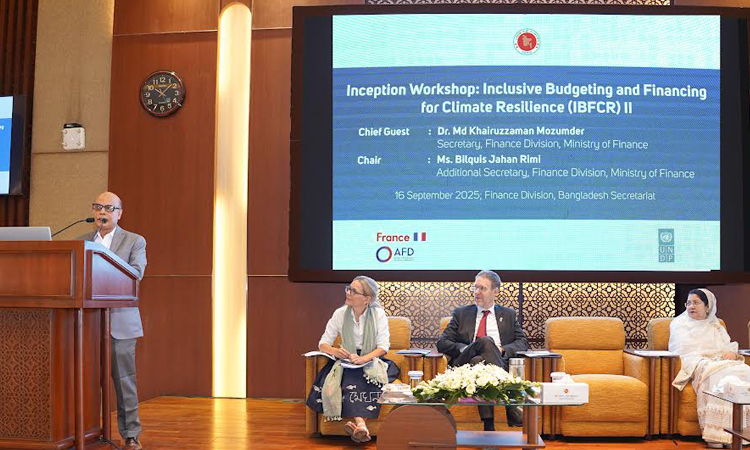News Flash
News Flash

DHAKA, Sept 16, 2025 (BSS) - Bangladesh has stepped up its climate resilience efforts with the launch of the second phase of its Inclusive Budgeting and Financing for Climate Resilience (IBFCR) programme, aimed at tackling the devastating consequences of climate change that already cost the country nearly US$1 billion annually.
This was disclosed in a launching ceremony of IBFCR-II, held at the Finance Division in the city today, said a press release.
It was also shared in the launching ceremony that the global warming reached a record 1.55øC above pre-industrial levels in 2024, intensifying climate threats for Bangladesh, one of the world's most vulnerable nations despite contributing less than 0.56 percent of global greenhouse gas emissions.
Tropical cyclones alone wipe out 0.7 percent of GDP each year, while agricultural output in the country's southern belt is projected to shrink by 18 percent by 2040. According to the World Bank, climate-induced migration could displace 13.3 million Bangladeshis by 2050.
To bridge a financing gap estimated at $12.5 billion annually, or 3 percent of GDP, the Finance Division, Ministry of Finance, in collaboration with UNDP and supported by Agence Fran‡aise de D‚veloppement (AFD), launched IBFCR Phase II.
Finance Division Secretary Dr. Md. Khairuzzaman Mozumder attended the inaugural session as chief guest, while the event was chaired by Additional Secretary, Finance Division Bilquis Jahan Rimi. UNDP Resident Representative Stefan Liller and AFD Deputy Country Director Cecilia Cortese joined as special guests. The welcome address was delivered by Joint Secretary Md. Nazrul Islam, followed by a vote of thanks from Joint Secretary Md. Muhammad Abul Kasem.
Dr. Md. Khairuzzaman Mozumder in his speech said, "Although Bangladesh contributes very little to global emissions, we remain one of the most climate-vulnerable countries, bearing the consequences of actions by others. We are fully committed to adopting adaptation programmes and mitigation measures, and I believe the second phase of the IBFCR programme will take us another step forward in building resilience for our people and economy." He also mentioned that, "The Climate Change Action Plan, which we formulated and revised last year, serves as a roadmap for guiding our efforts and ensuring effective resource mobilization."
Bilquis Jahan Rimi said, "Effective implementation requires a strong coordination mechanism that brings together key ministries and stakeholders. By enhancing cooperation and institutionalizing capacity, we can ensure that climate priorities are fully integrated into our public financial management system."
Stefan Liller in his speech said, "IBFCR-II is about bringing climate priorities into the heart of Public Finance, so that every taka spent delivers real results for people. Climate change is already shaping lives and livelihoods in Bangladesh".
Cecilia Cortese said, "IBFCR -II is a technical support programme, fully complementary to a ?300 million policy-based loan programme dedicated to supporting the Government in implementing its climate strategies and plans."
During the technical session, UNDP Programme Specialist Dr. Maliha Muzammil presented the roadmap for IBFCR Phase II. The session featured expert discussants including PKSF Deputy Managing Director Dr. Fazle Rabbi Sadeque Ahmed and CPD Executive Director Dr. Fahmida Khatun.
A panel discussion on "Climate-Informed Public Finance Management in Bangladesh" was moderated by Additional Secretary Dr. Ziaul Abedin of the Finance Division. Panelists included A K M Sohel, Additional Secretary of the Economic Relations Division; Dr. Fahmida Khanom, Additional Secretary of the Ministry of Environment, Forest and Climate Change; UNDP Country Economic Adviser Owais Parray; Additional Secretary Md. Hasanul Matin of the Finance Division; and Musrat Meh Jabin, Chief (Additional Secretary) at the Ministry of Planning.
IBFCR Phase-II will build on the lessons of the first phase by updating the Climate Fiscal Framework, strengthening climate finance tracking, and formulating a National Climate Finance Strategy. The programme will also promote the use of tools such as the Local Adaptation Plan of Action (LAPA) and Climate Vulnerability Index (CVI) to ensure financing reaches frontline communities.
Officials stressed that the initiative will enhance transparency, accountability, and coordination across ministries while aligning Bangladesh's budgetary system with the Paris Agreement, Sustainable Development Goals, and the country's own National Adaptation Plan (NAP) and Nationally Determined Contributions (NDC). By embedding climate resilience into public finance, Bangladesh aims to safeguard development gains and protect its citizens from escalating climate risks.